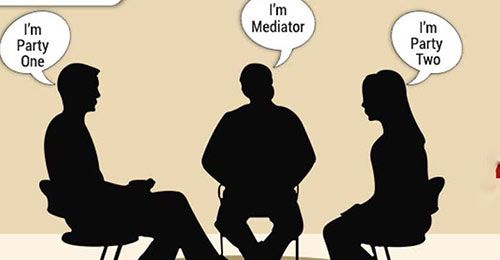
Human history is replete with the overt struggle between individuals or groups within a society and between nations.
According to some experts, conflicts are not only inevitable but can be healthy in any society.
Conflicts expose and bring to the fore problems in society, which provide an opportunity for creating better ways of doing things.
However, conflicts can only have a positive effect on society when resolved effectively between the conflicting parties.
It is the failure to successfully resolve conflicts that leads to hostilities, fighting, and wars, with its attendant negative consequences.
In law, mediation is one of the Alternative Dispute Resolution mechanisms where a mediator helps the conflicting parties resolve their dispute.
One good thing about mediation is that it is the disputing parties themselves that determine the outcome and not a judicial officer. However, agreements reached during mediation can become a binding contract or be made a judgment of court.
Many clients consult their attorneys to be part of the mediation process because of the vital roles lawyers can play.
Unfortunately, some lawyers, instead of helping advance their clients’ cases through the mediation sessions, become clogs in the process.
To effectively represent your clients in mediation, lawyers should be wary of and avoid the following mediation mistakes.
Mediating at the Wrong Time.
Timing is essential in mediation and will determine whether it will succeed or not. The time to initiate or accept mediation will depend on the facts and circumstances of every case.
Some cases require early mediation. An example of where early mediation will be necessary is a case where parties have a continuing relationship.
Where parties have a long-term contract or relationship, commencing early mediation will help the parties continue their business.
At other times, however, starting mediation earlier than necessary can create more problems for the parties.
In some cases, early mediation can give the other side the impression that you are in a weak position and desperate to settle.
Unless you have a good relationship with an opposing counsel, resist the temptation of initiating mediation too early.
Failure to Have a Pre-Mediation Meeting.
Many mediation efforts fail because many lawyers do not make an effort to reach out to the other side before the actual mediation.
In litigation, pre-trial proceedings simplify many of the processes and get parties ready for trial.
In mediation, lawyers should demand documents and any other information concerning the issues in dispute before the mediation starts.
Meeting the other side before the mediation process starts will help the conflicting sides focus on the crucial issues in dispute.
It can be frustrating when lawyers and their clients claim not to have the necessary documents and information during negotiation.
Not Preparing Your Client.
Many clients fail to understand that mediation is different from litigation. It is, therefore, the responsibility of lawyers to educate their clients on the processes of mediation.
Unfortunately, some lawyers fail to prepare their clients who come to mediation with the same expectation they have of litigation.
Failure to prepare your clients means that they’ll come to the mediation with a ‘winning’ mentality and expectation.
But mediation is not about winning your case. It is rather about shifting grounds to enable the parties to reach a peaceful resolution of their problems.
Failure to Plan.
Another mistake some lawyers make in mediation is failing to have a plan during the mediation process.
It is vital to understand your client’s case and know the extent your client is willing to go to make the mediation process work.
A good lawyer should have a frank discussion with his client about all the possible consequences of non-mediation processes.
If your client knows that there is a possibility of losing everything during the trial, he will be willing to concede some grounds during mediation.
Good planning involves being realistic with your client and being flexible where necessary to make the process work.
Stonewalling.
Stonewalling in negotiation involves the method of delaying or obstructing a process by being evasive or not providing the required answer.
Although some lawyers use stonewalling to earn some advantage for their clients during negotiations, others use it to frustrate the process.
In mediation, some clients expect their attorneys to be tough and not easily give in to the other side. But lawyers must, however, be frank and realistic in their demands.
Preventing Clients from Talking to Each Other.
One of the challenges that mediators face during mediation is when some lawyers prevent their clients from talking to the other parties in dispute.
Mediators usually make it clear that in mediation, the disputing parties should feel free to talk to the other parties and make concessions.
Some lawyers, however, prevent their clients from making suggestions and concessions without their approval.
When lawyers prevent their clients from communicating with a disputant, it can prolong or even jeopardize the mediation process.
Wrap Up.
According to some statistics, the success rate of mediation as a form of dispute resolution is pretty high.
Those who have succeeded in settling their disputes through mediation showed some level of commitment in the process.
Many mediators have complained that some lawyers do not help the process by their unwillingness to shift ground.
Lawyers should, therefore, do more to help the process by changing their mentality towards mediation.
By avoiding the above mistakes, you will be helping your clients settle their matters on time, and also handle your business more efficiently.
In this article:
